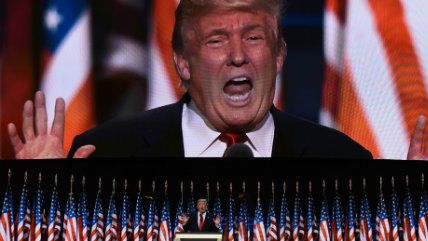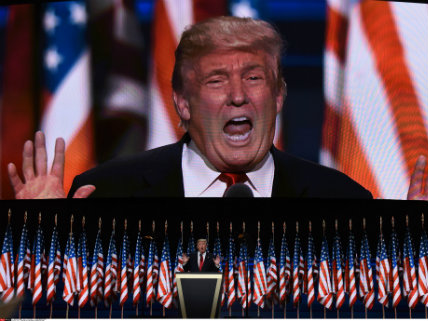Biggest Police Union in the Country Endorses Trump
After Clinton didn't respond to its candidate survey, the Fraternal Order of Police endorses Trump, citing his "real commitment to American law enforcement."


The Fraternal Order of Police, the largest police union in the U.S., endorsed Donald Trump president, citing his "his real commitment to American law enforcement" and desire to "make America safe again."
In a press release, the FOP, which says it represents 330,000 law enforcement officials, said Trump secured the endorsement with the support of more than two-thirds of the FOP's board, where members were given a choice between Trump, Hillary Clinton, or neither candidate.
"[Trump] has seriously looked at the issues facing law enforcement today," national FOP president Chuck Canterbury said in a statement. "He understands and supports our priorities and our members believe he will make America safe again."
Earlier this year, the FOP sent both candidates a questionnaire on their positions regarding law enforcement issues in the country. Clinton didn't respond, a snub that did not go unnoticed.
Trump, on the other hand, has courted law enforcement over his campaign. In his response to the FOP questionnaire, he supported, among other things, reviving the controversial transfer of some military equipment, like grenade launchers and armored personnel carriers, from the Pentagon to local and state police departments.
On the stump, Trump has portrayed himself as the "law and order" candidate, invoking rising murder rates in some major cities and vowing to crack on crime. "Decades of progress made in bringing down crime are now being reversed by this Administration's rollback of criminal enforcement," Trump warned in his July speech accepting the Republican nomination for president.
As I've reported, criminal justice groups say the rise in violent crime is clustered in a few major cities, and they've decried Trump's rhetoric as fear-mongering.
"Obviously this is an unusual election," FOP president Canterbury continued. "We have a candidate who declined to seek an endorsement and a candidate without any record as an elected official. Donald Trump may not ever have been elected to public but he is a proven leader and that's what we need for the next four years—a leader unafraid to make tough choices and see them through."
The FOP declined to endorse a candidate in the 2012 presidential election, reportedly over concerns with Mitt Romney's position on collective bargaining rights. In 2008, it endorsed John McCain.
The Clinton campaign's decision to not respond to the FOP survey or actively seek its endorsement reflect the heated politics surrounding law enforcement this election year. Amid the widespread protests over police shootings, Clinton has worked to distance herself from her old statements and positions on criminal justice, which mirrored much of the "tough on crime" rhetoric of the 1990s.
Meanwhile, the fatal shooting of five Dallas Police Officers in July led to a renewed push in Congress and state legislatures for so-called "blue lives matter" bills, which can make assaulting or killing a law enforcement officer a hate crime.
Earlier this summer, Black Lives Matter activists held protests at both the Fraternal Order of Police legislative headquarters in Washington, D.C. and the Patrolmen's Benevolent Association, which represents NYPD officers, in New York City. The protesters said the unions were a major force behind "blue lives matter" bills and blocking efforts to improve police transparency and accountability.


Show Comments (576)